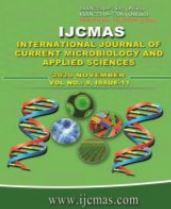


 National Academy of Agricultural Sciences (NAAS)
National Academy of Agricultural Sciences (NAAS)

|
PRINT ISSN : 2319-7692
Online ISSN : 2319-7706 Issues : 12 per year Publisher : Excellent Publishers Email : editorijcmas@gmail.com / submit@ijcmas.com Editor-in-chief: Dr.M.Prakash Index Copernicus ICV 2018: 95.39 NAAS RATING 2020: 5.38 |
Pigeonpea sterility mosaic virus (PPSMV), a species of the genus Emaravirus, is the causal agent of sterility mosaic disease (SMD) of pigeonpea (Cajanuscajan (L.) Millsp]. The aetiology of SMD, which remained a mystery for over 70 years, was resolved with the discovery of PPSMV in 2000 and its complete genome sequence in 2014. SMD is characterized by stunted and bushy plants, leaves of reduced size with chlorotic rings or mosaic symptoms, and partial or complete cessation of flower production (i.e. sterility). The causal agent of the disease is PPSMV, a virus with a segmented, negative-sense, single-stranded RNA genome, transmitted in a semi-persistent manner by an eriophyid mite Aceriacajani Channabassavanna (Acari: Arthropoda). Both the virus and vector are highly specific to pigeonpea and a few of its wild relatives, such as C. scarabaeoides and C. cajanifolius. A high yielding redgram culture CRG 10-01 was a cross derivative of APK 1x LRG 41 and matures in 170 to 180 days was released from TNAU. The culture reported an average grain yield of 1600 kg/ha under rainfed condition and 1800 kg/ha under irrigated condition with a yield increase of 19 percent over CO 6 and 22 percent over VBN 2.Now this variety is observed with incidence of sterility mosaic virus. While conducting the experiment on seed driller for facilitating two-way power operated weeder at Tamil Nadu Agricultural University, Coimbatore in Redgram Co (Rg) 8; the incidence of sterility mosaic was first noticed during 2017 -18 (Fig. 1). Then in a Front-Line demonstration on the moisture conservation practices in Redgram Co (Rg) 8, conducted during Aug’2020 at Farmers’ field of Kutladampatti, Vadipatti, Madurai also expressed with a pigeonpea sterility mosaic virus disease on 39 DAS and hence reported for the susceptibility of Co (Rg) 8 to the PSMV. This information is documented for the benefit of researchers and farmers in managing this disease.
 |
 |
 |
 |
 |